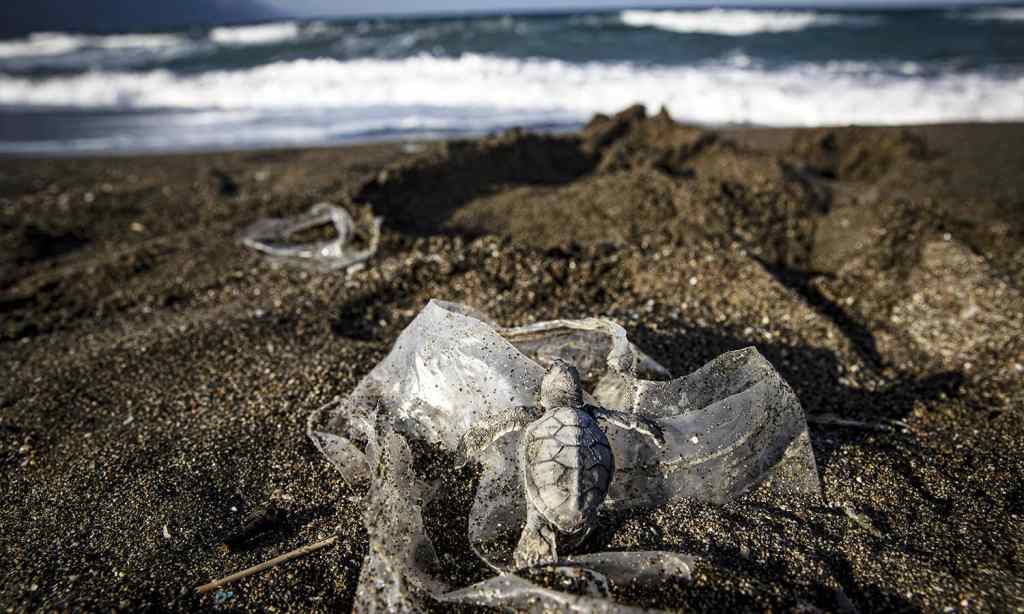It’s no secret that our planet is being absolutely suffocated with plastic. More than just a waste issue, plastic is broken down into fine particles that find their way into our drinking water, our air, and our food.
It’s shocking to think that while we have international treaties on water quality, air quality, and a myriad of other things, there’s nothing addressing arguably the fastest-growing environmental issue to date.
That’s why representatives from member states have sat down this week in Nairobi, Kenya, to draft a resolution that could lead to a global plastics treaty. It’s on the programme for discussion during the fifth session of the United Nations Environment Assembly ( UNEA) which has been taking place over the past few days.
The draft resolution, called “End plastic pollution: Towards an internationally legally binding instrument”, looks to tackle “the full lifecycle of plastic”, including its production, design, and waste.
It’s a key step in what could be the most ambitious global environmental agreement since the Paris Climate Accord of 2015.
The UN has now signed off on the agreement to create the world’s first global plastic pollution treaty and will begin working towards getting the treaty ratified by all member states.
“We’re making history today and you should all be proud,” said Espen Barth Eide, president of the UNEA.
What Is the UN Plastic Treaty?
Right now, the treaty is very much in draft form, but UN diplomats are hopeful that it will rapidly progress to an international treaty soon.
The draft resolution agreed to at the UNEA meeting recommends that a treaty be created to deal with plastic in all stages of its life cycle, including the promotion of re-cycling plastics so as to reduce the demand for crude oil.
It’s a vitally important agreement as plastic is literally everywhere and causing untold disasters that we are only just beginning to understand.
Scientists have found microplastics in all of the major filtering organs of the human body, concluding that this stuff is likely inside each and every one of us. We have very little idea what the long term impacts of humans being full of plastic are, but we’re pretty sure it isn’t good.
Not only is plastic an issue for our health, it’s a major environmental issue. Vast global dumping grounds established in parts of South East Asia and African countries like Ghana and Kenya are reaching breaking points, the ocean is rammed with an additional 11 million tonnes each year, and the UN recently warned that Earth itself could become “a human sacrifice zone” because of the sheer volume of plastic waste.
Experts have stated that a plastics treaty is essential and urgent because of issues such as these. They argue that it must incorporate human rights frameworks — preventative measures to stop making more plastic — and ‘polluter pays’ structures, which would put the onus of dealing with plastic waste back on the producer, rather than the individual.
However, like many UN resolutions, the treaty can only be meaningful and valuable if it is legally binding, with politicians divided on how best to approach this.
“We all know that an agreement will only count if it is legally binding. If it adopts a full lifecycle approach, stretching from extraction to production to waste,” Anderson said.
What Happens Next?
UNEA experts are hoping to get this draft resolution signed off as a full UN treaty within the next two years.
The draft text itself was finalised on Monday after a week of late-night negotiations. Government ministers and high-level officials, who joined the talks on Monday, gave their final approval to the draft framework on Wednesday.
🚨800 millions tons of plastics ago (that's 658 days ago for those not measuring in plastic production) I started working to support evidence-based on the full lifecycle of plastics. I applaud #UNEA5's adoption of a mandate for negotiate a #plasticstreaty to #EndPlasticPollution pic.twitter.com/uk2XyZsGSp
— Andrés Del Castillo #PlasticsTreaty (@andresdelcas) March 2, 2022
If the current draft is approved, it would be a major setback for big oil and chemical companies that make plastic and have, reportedly, been working behind the scenes to keep the talks focused on waste and not on production.
Now that the draft is agreed upon, an intergovernmental negotiating committee will be established to work out the full details of the treaty, however UN officials have warned that there is still a long way to go before that.
“This is only the end of the beginning, we have a lot of work ahead of us,” said Monica Medina, the head of the US delegation. “But it is the beginning of the end of the scourge of plastic waste for this planet.”
Switzerland’s ambassador for the environment Franz Perrez has said that, while there is major public support for a plastics ban, there are certain actors who may attempt to hamper negotiations.
“This is a division between those who are ambitious and want to find a solution and those who don’t want to find a solution for whatever reasons,” he said.
The aim is to have the treaty ready for full debate and agreement in 2024.
Read more stories from The Latch and subscribe to our email newsletter.







